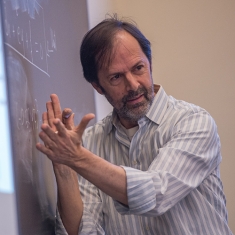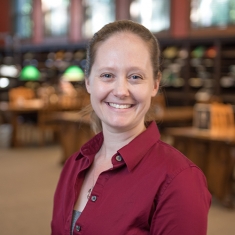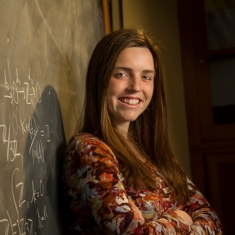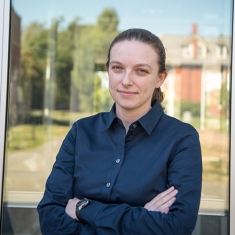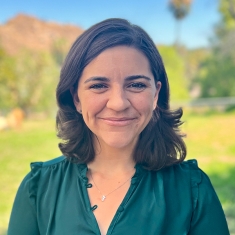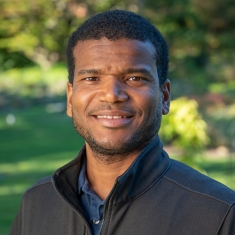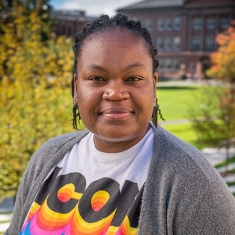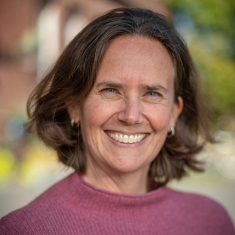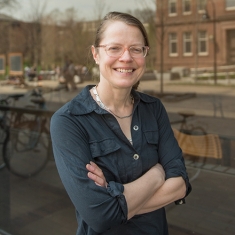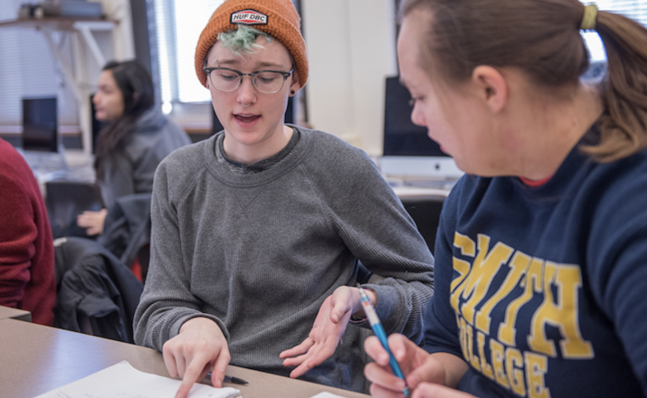Mathematical Sciences
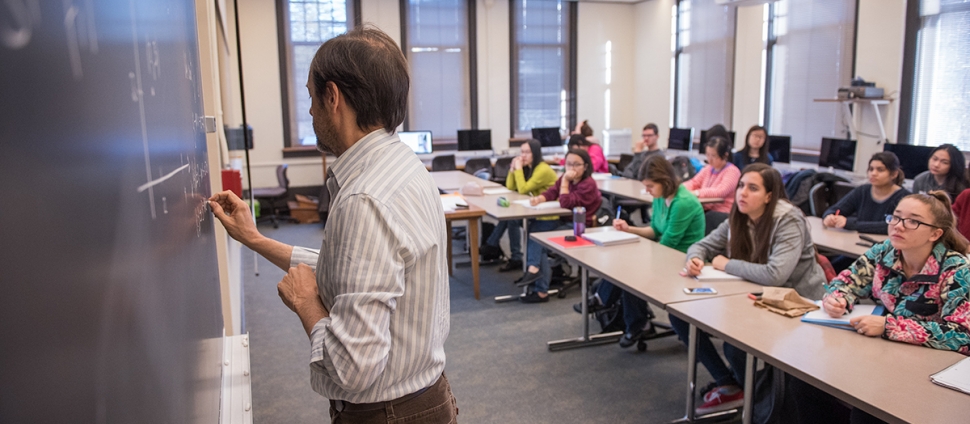
Mathematics is one of the oldest disciplines of study. For all its antiquity, however, it is a modern, rapidly growing field. Only 70 years ago, mathematics might have been said to consist of algebra, analysis, number theory and geometry. Today, so many new areas have sprouted that the term “mathematics” seems almost inadequate. A new phrase, “the mathematical sciences” has come into fashion to describe a broad discipline that includes the blossoming fields of statistics, operations research, biomathematics and information science, as well as the traditional branches of pure and applied mathematics.
Announcements
Save the Date! WIMIN 2023
Our annual WIMIN Conference will take place here at Smith College on Saturday, 9/23 from 9 AM- 5:30 PM, featuring plenary speakers Melody Chan (Brown University) and Karamatou Yacoubou Djima (Wellesley College), plus student talks, and a panel discussion about graduate school in math. Check the website for updates and registration information!
This year's Conference features a performance of Diving into Math with Emmy Noether by PortraitTheater.
Weekly Departmental Lunch Series
Please join us for our weekly departmental lunch series, Thursdays at 12:10 in the Math Forum! Lunch provided; bring your own drink. See calendar.
Declaring a Math Major or Minor
Here are some slides from our most recent presentation of the major:
If you'd like to declare a major or minor, the first step is to fill out this advisor request form.
- Given a problem, to recognize its mathematical aspects and to produce an abstract mathematical model for the problem.
- Basic mathematical skills (through discrete math, the calculus course, and linear algebra).
- To write mathematics effectively:
- Math track: To understand and write mathematical proofs.
- Stats track: To write a professional-level technical report.
- To speak mathematics or statistical terms effectively in oral presentations.
- To use technology appropriately to learn and understand mathematics.
Advisers: Pau Atela, Benjamin Baumer, Jennifer Beichman, Patricia Cahn, Luca Capogna, Christophe Golé, Rajan Mehta, Geremias Polanco, Candice Price, Ileana Streinu, Becca Thomases, Julianna Tymoczko
If you'd like to declare a math major or minor, the first step is to fill out an advisor preference form here.
The mathematics major has a foundation requirement, a core requirement, a depth requirement and a total credit requirement.
The foundation requirement consists of MTH 111, MTH 112, MTH 153, MTH 211, and MTH 212. Some of these requirements might be waived for a well-prepared student.
The core requirement consists of one course in algebra (MTH 233 or MTH 238) and one course in analysis (MTH 280 or MTH 281). Alternatively, students declaring a math major before Fall '22 may focus on statistics; students pursuing this track through the major are not required to take a course in algebra but instead must complete MTH 220, MTH 246, MTH 320, and either MTH 291 or MTH 290. Students intending to declare a major after Fall '22 do not have this option and are advised to pursue a MST Major (Mathematical Statistics).
Majors are required to take at least one advanced course. This is the depth requirement. An advanced course is a mathematics course at Smith numbered between 310 and 390.
- In total, majors must take at least 36 credits among courses numbered at or above 153, with the following exceptions:
- With the approval of the department, up to 8 of the credits may be satisfied by courses taken outside the mathematics and statistics department.
- Courses taken outside the department must contain either substantial mathematical content at a level more advanced than MTH 211 and 212 or statistical content at a level more advanced than MTH 220. Generally, such a 4-credit course will be given 2 credits toward the mathematics major.
- Note that courses that are cross-listed with mathematics and another department (CSC 250, ECO 220, PHI 202, PHI 203, PHI 220, and SDS 292) are counted as mathematics courses and given full credit toward the mathematics major. The following courses meet the criteria for 2 credits toward mathematics major: AST 337, AST 351, AST 352, CHM 331, CHM 332, CSC 240, CSC 252, CSC 274, CSC 334, ECO 240, ECO 255, EGR 220, EGR 315, EGR 320, EGR 326, EGR 374, EGR 389, LOG 100, PHY 210, PHY 317, PHY 318, PHY 319, PHY 327, and SDS 293. A student may petition the department if she wishes credit for any course not on this list.
Normally, all courses that are counted towards either the major or minor must be taken for a letter grade.
The major in mathematical statistics (MST) is designed to prepare students for graduate study in statistics and closely-related disciplines (e.g., biostatistics). The MST major overlaps with the major in Statistical & Data Sciences (SDS), but places a heavier emphasis on the theoretical development of statistics. MST majors will develop sophisticated mathematical skills to prepare for rigorous future study. The MST major also overlaps with the major in Mathematical Sciences (MTH), but focuses on statistics and replaces the algebra requirement with a computing requirement.
A student majoring in MST cannot have a second major in either SDS or MTH. Students contemplating a double major in MTH and SDS should choose to major in MST.
Advisers:
- For an advisor in MTH, please fill out an advisor preference form here
- For an advisor in SDS, please fill out this form https://bit.ly/sds_advisor
Please see the major requirement diagram.
Requirements
- Mathematical Foundations (3 courses): The following required courses build foundational mathematical skills.
- MTH 153: Introduction to Discrete Mathematics
- MTH 211: Linear Algebra
- MTH 212: Calculus III
- Statistical Foundations (2 courses): These courses develop a strong foundation in applied statistics.
- SDS 201 or SDS 220: Introduction to Statistics
- SDS 291: Multiple Regression
- Statistics Depth (1 course): Choose one additional course that provides exposure to additional statistical models.
- SDS 290: Research Design and Analysis
- SDS 293: Modeling for Machine Learning
- SDS 390: Topics in Statistical and Data Sciences
- Mathematics Depth (1 course): Choose one rigorous course in theoretical mathematics.
- MTH 280: Advanced Calculus
- MTH 281: Introduction to Analysis
- Programming (1 course): Choose one course that provides exposure to computer programming.
- SDS 192: Introduction to Data Science
- CSC 110: Introduction to Computer Science
- CSC 120: Object Oriented Programming
- Theoretical Statistics (2 courses): A two-course sequence that most directly reflects the graduate school experience.
- MTH 246: Probability
- MTH/SDS 320: Mathematical Statistics
- Electives: (as needed to complete 10 courses): Provided that the requirements listed above are met, other courses may be counted as electives to reach the 10-course requirement. Five College courses in statistics, mathematics, and computer science may be taken as electives. Students should consult with their adviser to determine appropriate electives.
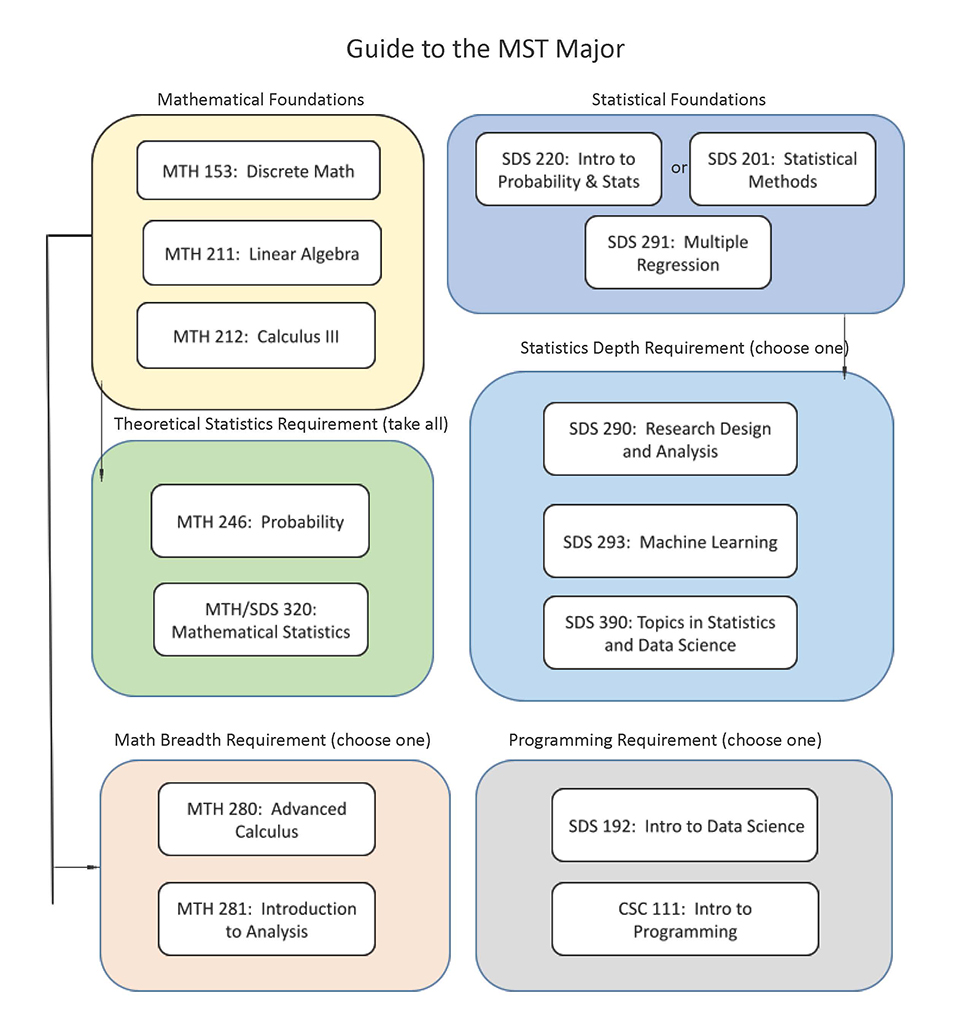
The Minor in Mathematical Sciences
The minor in mathematics consists of 211 and 16 credits taken from among the following: 153, 205 and courses numbered above 211, including two courses above 218. Four of the credits may be replaced by eight credits from the list of approved courses counting for 2 credits towards the MTH major in the description of the major requirements found above.
The Minor in Applied Statistics
The interdepartmental minor in applied statistics offers students a chance to study statistics in the context of a field of application of interest to the student. The minor is designed with enough flexibility to allow a student to choose among many possible fields of application. The minor consists of five courses. Among the courses used to satisfy the student’s major requirement, a maximum of two courses can count towards the minor. Ordinarily, no more than one course graded S/U will be counted towards the minor. See the Statistical & Data Sciences website for more information.
An honors project consists of directed reading, investigation and a thesis. This is an opportunity to engage in scholarship at a high level. A student at any level considering an honors project is encouraged to consult with the director of honors and any member of the department to obtain advice and further information.
Honors projects in the Department of Mathematics & Statistics are worth 8–12 credits. Ideally, your program should be approved by the department in the spring before your senior year. (You might also consider applying for a summer research grant from Smith so you can spend the summer before your senior year in Northampton beginning the work on your project.)
Eligibility
Normally, a student who applies to do honors work must have an overall 3.0 GPA for courses through her junior year, and a 3.3 GPA for courses in her major. A student may apply either in the second semester of her junior year or by the second week of the first semester of her senior year; we strongly recommend the former.
Financial Assistance
The Tomlinson Memorial fund provides financial assistance for honors thesis projects. If you're interested in obtaining funds you must complete the application form "Financial Assistance for Departmental Honors" and submit it with your honors application. This application form can be obtained from the director of honors or the class deans office.
Timeline*
Typically, you meet with your project adviser several times a week. Usually the project focuses on one area and involves reading mathematics papers and books at an advanced level. The honors paper you write will be an assimilation and exposition of the area. Occasionally, a project will include new contributions by the student. By early spring, most of your research should be complete and you will begin writing. The paper is due in the middle of April. It is read by a panel of faculty members, and in early May you present a talk to the department on your work.
Presentation of Thesis
Smith College rules stipulate that the final draft of your thesis must be submitted to your faculty adviser (first reader) and second reader by April 15*. This final draft will be the one subject to evaluation by the first and second readers. Honors candidates give a 45-minute oral presentation of their honors research for the mathematics faculty, which will be open to all interested members of the Smith College community and others by invitation.
You should expect to take questions from the audience during and after the presentation. Following the open presentation there will be an additional question period for the mathematics faculty only. This presentation will be scheduled during the last week of classes, or reading period, but no later than the last day of the pre-examination study period.
Evaluation
- 60% thesis
- 20% oral presentation
- 20% grades in the major
Your grade for the project (pass, distinction, high distinction, highest distinction) is determined by a combination of your grades on the paper, the presentation and your mathematics courses. The presentation has the least weight in your grade, but it gives us all a chance to hear about what you have done. We also invite you to give a talk to your fellow majors, though this is not part of the official process.
*Timeline is for May graduates. Consult your adviser about dates if you plan to graduate in January.
Whatever your reasons to study math or statistics, we, or our colleagues in Statistics & Data Science, have something for you! And by the time you take a course with us, we hope that you will have enjoyed it so much that you will take another one just because it’s cool…
Why do I need math at all?
If you haven’t enjoyed your mathematics courses or have found them frustrating, the need to take more math in college for your major can be irritating. Or maybe you are delighted that you’ll be taking more math! Students have completely different experiences of mathematics courses, and here we would like to lay out some reasons that all students should be excited about taking math.
You have probably heard the refrain “Math is everywhere!” many times before, and it’s true: math IS everywhere. From computing your GPA (a weighted average) to understanding how debt works (compounding interest), math runs through most facets of our lives, and increasingly in the data driven industry. For instance, how should a large trucking company allocate its storage of empty trailor around the country to minimize the number of miles empty trailors travel? This is a difficult math problem that generates jobs and saves the environment!
In practical terms, even if you do not choose to do a math major, a number of other majors - and professions! - require math. The most common ones are:
-
MTH 111 Calculus I (Economics, Engineering, Physics, Statistics & Data Science, Pre-health)
-
MTH 112 Calculus II (Engineering, Physics)
-
MTH 153 Discrete Math (Computer Science)
-
MTH 211 Linear Algebra (Statistics & Data Science)
-
MTH 212 Calc III (Engineering, Physics)
-
SDS/MTH 220 Intro to Probability and Stats (Statistics & Data Science, Biology, Economics; recommended for Engineering and Pre-health)
What courses am I prepared to take?
A student who wishes to study mathematics may place herself according to the following guidelines.
-
Any student who is curious about mathematics outside of the standard fields seen in high school may consider Discovering Mathematics (MTH105). Some incarnation of the course have explored arts and math, the role of chance in our lives, and measuring social inequalities.
-
A student with three years of high school math (typically one year of geometry and two years of algebra) is ready for Elementary Functions (MTH102), which can prepare them to take Calculus I.
-
A student with four years of high school math (but little or no calculus) can take Calculus I (MTH111).
-
A student with a year of high school calculus is ready to take Discrete Mathematics (MTH153) or Calculus II (MTH112).
-
Well-prepared students might start at Smith with Linear Algebra (MTH211) or Calculus III (MTH212).
Below is a more detailed document matching your preparation with possible courses.
For statistics courses you are prepared to take, consult this Statistics and Data Science page.
For detailed information about the introductory calculus courses as Smith, including how they work and they help you do the things you want to do with your time at Smith, visit the Introductory Mathematics Courses at Smith website.
The introductory calculus courses (MTH111: Calculus 1 and MTH112: Calculus 2) at Smith are offered in small sections of 20-28 students, taught by different professors. The sections of each introductory course are closely coordinated to maximize the resources available to students and make it easy for students to work together during the semester. Those resources include department peer tutors, quantitative skills tutors through the Spinelli Center for Quantitative Learning, and the department Calculus Training Group program, profiled in Grecourt Gate in November 2017.
For those who either do not intend to take Calculus or who have already taken enough of it, there is math besides Calculus!
MTH153: Introduction to Discrete Mathematics
Description: An introduction to discrete (finite) mathematics with emphasis on the study of algorithms and on applications to mathematical modeling and computer science. Topics include sets, logic, graph theory, induction, recursion, counting and combinatorics.
Offered: Every semester
Prerequisite: None, but MTH111 and familiarity with summation notation is recommended
Great for: Computer Science, Mathematics & Statistics, Statistics & Data Science – the study of logic and algorithms is necessary for good coding. In addition, you learn a variety of proof techniques, which are key for going deeper in mathematics as a whole.
MTH211: Linear Algebra
Description: Systems of linear equations, matrices, linear transformations, vector spaces. Applications to be selected from differential equations, foundations of physics, geometry and other topics.
Prerequisite: MTH 112 or the equivalent, or MTH 111 and MTH 153; MTH 153 is suggested
Offered: Every semester
Great for: Almost everyone, but specifically Computer Science, Mathematics & Statistics, Statistics & Data Science, Economics. Linear algebra is the workhorse subject of modern mathematics. Any work with data relies on an understanding of matrices. Linear algebra is even used to help identify exoplanets in astronomy! It turns up pretty much everywhere.
Required for: MTH and SDS majors.
MTH212: Calculus III
Description: Theory and applications of limits, derivatives and integrals of functions of one, two and three variables. Curves in two and three dimensional space, vector functions, double and triple integrals, polar, cylindrical, spherical coordinates. Path integration and Green’s Theorem.
Prerequisites: MTH 112. It is suggested that MTH 211 be taken before or concurrently with MTH 212.
Offered: Every semester
Great for: Physics, Engineering, Mathematics & Statistics, Economics. Calculus III takes everything from calculus and moves into multiple dimensions. For physics and engineering, understanding of more than one dimension is essential for modeling how objects move through our multi-dimensional space. In economics, you often need to optimize quantities with many different inputs (and sometimes outputs!) which Calculus III can do.
Required for: EGR and MTH majors.
MTH/SDS220: Introduction to Probability and Statistics
Description: An application-oriented introduction to modern statistical inference: study design, descriptive statistics; random variables; probability and sampling distributions; point and interval estimates; hypothesis tests, resampling procedures and multiple regression. A wide variety of applications from the natural and social sciences are used. Classes meet for lecture/discussion and for a required laboratory that emphasizes analysis of real data.
Prerequisite: MTH 111 or the equivalent, or permission of the instructor. Lab sections limited to 20
Offered: Every semester
Great for: Everybody. Data analysis is a growing field and understanding how to work with data is useful in many fields. MTH 220 satisfies the basis requirement for biological science, engineering, environmental science, neuroscience and psychology.
Required for: BIO, EGR, ESP, NSC, PSY, SDS.
Note: Other departments offer statistics courses with different prerequisites, and for which SDS 220 may be substituted (e.g. PSY/SDS 201, ECO 220)
Consult the Smith College Course Catalog for information on the current courses available in mathematics and statistics.
There are also several courses that are available for credit from other departments, including art, psychology and more. Consult the catalog.
What classes you should take depends a great deal on what you find most interesting and on what your goals are. Discuss your options with your adviser and also talk to the instructors of particular courses that interest you.
If you are interested in the sciences
The department offers a variety of courses to give you a solid mathematical experience. Calculus III and Linear Algebra are fundamental courses. You may also want to consider taking one or more of the following: Intro to Probability and Statistics, Differential Equations, Differential Equations and Numerical Methods, Discrete Mathematics, Advanced Topics in Continuous Applied Mathematics.
If you are interested in computer science
Consider taking some of these: Calculus III, Linear Algebra, Modern Algebra, Discrete Mathematics. Many of our students are double–majoring in mathematics and computer science.
If you are interested in economics
Calculus will give you a good, basic experience. You may consider other courses as well, so be sure to discuss your options with your adviser. If you are contemplating graduate school in economics, the economics department recommends you to take MTH 211, 212, 280 and 281. Taking a solid course in statistics is also a good idea (any of MTH 220, 246, 290, 291 and 320 would do). Many economics majors want to take MTH 264 as well. Double–majoring in mathematics and economics is a good choice.
If you are interested in applied mathematics
The following courses work specifically with applications: MTH 205, 264, 353 and 364. Other courses that contain many applications and are important for anyone considering graduate school in applied mathematics are: MTH 220, 246, 254, 255, 280, 290, 291, and 320.
If you are interested in theoretical mathematics
The following courses work with abstract structures: MTH 233, 238, 246, 254, 255, 280, 281, 333, 370, 381, and 382.
If you liked calculus
There are many reasons for liking calculus. If you delighted in the geometry, for example, you should consider MTH 270, 280, 370 and 382. If you enjoyed the power of calculus to describe and understand the world, you will want to take MTH 264. If you are fascinated with the ideas of limit and infinity and want to get to the bottom of them, you should take MTH 281.
If you liked linear algebra
You will like MTH 233 very much, and you will also like MTH 238 and 333.
If you liked discrete mathematics
The natural sequel to Discrete Mathematics is MTH 254 or 255 and then 353. In addition, you may be interested in MTH 246 and in CSC 252 (counts 2 credits toward the mathematics major).
If you are interested in graduate school in mathematics
Take a lot of courses, but be sure to take MTH 233, 254, and 281 and as many of MTH 264, 333, 370, 381, and 382 as possible. You should also consider taking a graduate course at the University of Massachusetts.
If you are interested in graduate school in statistics
The MST Mathematical Statistics joint Major between MTH and SDS is explicitly designed as a preparation for graduate school in Statistics.
If you are interested in graduate school in operations research
Operations research is a relatively new subarea of mathematics, bringing together mathematical ideas and techniques that are applied to large organizations such as businesses, computers, and governments. You should take MTH 211 and at least some of the courses listed for statistics above, some combinatorics (MTH 254) and some computer science. Consider also Topics in Applied Mathematics and Numerical Analysis.
If you want to be a teacher
Certification requirements vary widely from state–to–state. If you are interested in teaching in secondary school, a mathematics major plus practice teaching may be enough to get started. In Massachusetts, the major should include either MTH 233 or 238 and one of MTH 220 or 246. A course involving geometry, such as MTH 270 or MTH 370 is also helpful. You should also have some introduction to computers. For guidelines, look at the list of courses listed in the MAT program. Finally, while MTH 307 Topics in Mathematics Education is rarely offered, something equivalent is taught as a special studies whenever there are MAT students.
If you are interested in teaching elementary school, most of your required courses will be in the education department. In the mathematics department, our concern would be that you are comfortable with mathematics, have seen its variety, and most important, that you enjoy it. For all that, you should take the mathematics courses which appeal to you most. For education courses, the latest information is that you should take EDC 235, 238, 346, 347, 404 (practice teaching), and one elective to be certified. Note that during the semester when you take practice teaching EDC 404, you will likely be unable to take a math course. Plan ahead and consult the education department.
If you want to be a doctor
You are doing fine by majoring in mathematics. A course in statistics would be a very good idea. Other areas of mathematics that would be useful are differential equations and combinatorics.
If you want to be an actuary
Take MTH 246, 290, 291 and 320 and the actuarial exams that are offered periodically. Advancement as an actuary is achieved by passing of a series of examinations. Informal student study groups often form (ask around!).
If you want to get a good job when you graduate
A major in mathematics prepares you well, regardless of which courses you choose. Math majors learn to think on their feet; they aren't frightened of numbers and they're at home with abstract ideas. Often, this alone is what employers are looking for. That said, we should add that knowledge of computer programming is very useful, as is some familiarity with statistics.
If you want something Smith does not offer
If you are interested in a subject we do not offer, you should talk to professors whose fields of interest are closest to the subject, as a special studies. The arrangement must be approved by the department, but reasonable requests are not refused. If your interest is particularly strong, you might consider an honors project, or summer research work. You should also consider taking a course (or courses) at one of the consortium schools.
Postbaccalaureate Program
Sponsored by the Center for Women in Mathematics, the Postbaccalaureate Program is for women with bachelor's degrees who did not major in mathematics or whose mathematics major was light. This program is open to all women who have graduated college with some course work in mathematics above the level of calculus, and a serious interest in further pursuing mathematics. More information about the program is provided by the Center for Women in Mathematics.
Masters of Arts in Teaching
The Department of Mathematics and Statistics cooperates with the Department of Education and Child Study to offer a one–year Master of Arts in Teaching (MAT) program.
During one summer and two semesters, MAT candidates take three courses in mathematics and all the course work required for secondary teacher certification in Massachusetts. The program includes a semester–long internship in a local school. Applicants for the MAT program in mathematics should have an undergraduate degree in mathematics. College graduates with a different major will be considered if their undergraduate education included a strong foundation in mathematics.
Fifth-Year Master of Science in Statistics
Qualified graduates of the Department of Mathematics and Statistics can apply to the University of Massachusetts Amherst to earn a master's degree in statistics in a fifth year. Learn more about the program.
Events
Thursday Lunch Talks
There is a department talk most Thursdays at lunch (provided, bring your own drink). The department talk is a chance for faculty, students and friends to hear an interesting talk and discuss mathematics.
Women in Mathematics in New England (WiMiN)
September 23, 2023
Our Women in Mathematics in New England (WiMiN) annual conference celebrates women in mathematics. We feature talks by dozens of undergraduates, graduate students and invited guests working in various mathematical fields.
Smith Mathematicians (SMath)
SMath is a gathering of this is an opportunity for current students, alumnae, and faculty to discuss their projects. This conference features food, faculty and student talks, and various panels.
Joint Mathematics Meetings (JMM)
JMM is a national conference organized by the Mathematical Association of America (MAA) and the American Mathematical Society. Past students of the Center's research class (MTH 300) have attended to present talks on their work, as well as hear about the latest advancements in a variety of mathematical topics.
Hudson River Undergraduate Mathematics Conference (HRUMC)
The HRUMC is a one-day mathematics conference held annually each spring semester at rotating institutions, and attended by students and faculty from various universities, colleges and community colleges in New York and New England. The conference features short talks by students and faculty and a longer invited address by a noted mathematician. Lunch and other light refreshments are served.
Emeriti
James Callahan
Professor Emeritus of Mathematics & Statistics
Phyllis Cassidy
Professor Emerita of Mathematics
David Cohen
Professor Emeritus of Mathematics & Statistics
Ruth Haas
Achilles Professor Emerita of Mathematics & Statistics
Katherine Halvorsen
Professor Emerita of Mathematics & Statistics
James Henle
Myra M. Sampson Professor Emeritus of Mathematics & Statistics
Mary Murphy
Senior Lecturer Emerita in Mathematics & Statistics
Marjorie Senechal
Louise Wolff Kahn Professor Emerita in Mathematics and History of Science & Technology
Patricia Sipe
Associate Professor Emerita of Mathematics & Statistics
Affiliated Faculty
Sarah-Marie Belcastro
Smith Research Affiliate
Ben Baumer
Associate Professor of Statistical & Data Sciences
Nicholas Horton
Research Associate in Statistical & Data Sciences
Joseph O’Rourke
Spencer T. and Ann W. Olin Professor of Computer Science and Professor of Mathematics & Statistics
Samet Sarioglin
Smith Research Affiliate (Visiting Researcher 2022–23)
Ileana Streanu
Charles N. Clark Professor of Computer Science
Opportunities & Resources
The Math Forum
The third floor of Burton Hall is the home of the Department of Mathematical Sciences. All faculty offices are located there, along with two computer laboratories/classrooms, a seminar room and the Forum. The Forum is a welcoming and comfortable space for conversation, study, relaxation, tea and cookies. It is a gathering place for students and teachers alike to meet tutors, to work in groups, read speculative fiction and ask questions both serious and idle.
Mathematics and Statistics Department Talks
There is a department talk most Thursdays at lunch for faculty, students and friends to hear an interesting talk and discuss mathematics. See the events calendar.
STATCOM
Statistics in the Community (STATCOM) is a volunteer community outreach organization. Directed and staffed by students, it provides professional statistical consulting services to governmental and nonprofit groups free of charge. The Five College Chapter includes graduates and undergraduates from the Five College system.
MathStudio
MathStudio is a creative studio space focusing on art and mathematics, directed by Pau Atela.
Teaching Assistants
Mathematical sciences teaching assistants are available Sundays through Thursdays from 7–9 p.m. during the semester. Mathematics teaching assistants are located in the Burton Forum (third floor). Statistics teaching assistants are located in Burton 301. After hours, the entrance to Burton is available from the main door or through the ramp from Sabin-Reed. The department is often looking for students to work as graders or teaching assistants. In addition, the Spinelli Center for Quantitative Learning hires many of our students.
Spinelli Center for Quantitative Learning
Tutoring, drop–in hours, one–on–one appointments and other resources are available for many mathematics and statistics classes at the Spinelli Center for Quantitative Learning.
Organizations
Awards
The department determines recipients for the following awards:
Suzan Rose Benedict Prize
Each year, the department awards the Suzan Rose Benedict Prize to an outstanding second-year student—and not necessarily a math major. In many years the prize has been shared.
2017 Recipients
- Ojaswi Acharya ’19
- Oumayma Koulouh ’19
- Rebecca Rohrlich ’19
Ann Kirsten Pokora Prize
Each year the department awards the Ann Kirsten Pokora Prize to a senior (or seniors) who excel in mathematics.
2017 Recipients
- Kyra Gan ’17
- Ellie Mainou ’17
- He Yun ’17
Competitions
Monthly Math Contest
During each month of the academic year, a mathematical problem is posted. The Smith student(s) with the largest number of correct solutions over the course of the year wins an all-expenses-paid trip to MathFest. They also take part in a national contest held during the conference. Anyone can submit a solution, but only Smith students are eligible for the prize.
National Competitions
Talk to faculty in the department to find out who is coaching students for the following competitions:
Putnam Competition (sponsored by the MAA)
The Putnam Competition involves one day of solving 12 hard math problems, requiring little more than calculus. Solve one and you're better than average. The competition occurs in early December, but Putnam practice sessions are held on campus beforehand.
Mathematical Contest in Modeling (COMAP)
This modeling contest occurs over three days, in which you and your team use mathematical modeling to present your solutions to real-world problems. The contest is in February.
Undergraduate Statistics Project Competition (USPROC)
This undergraduate competition in statistics involves students working on a statistical project involving real data. It occurs between January and May.
Budapest Semesters in Mathematics
Study Abroad Adviser: Pau Atela
The Budapest Semesters in Mathematics program (BSM) offers a broad spectrum of intermediate and advanced mathematics courses taught (in English) by respected Hungarian professors, as well as courses in Hungarian language and culture and European history. Most classes focus on the Hungarian fortes of discrete math and analysis.
Students can choose to attend the program for either a semester or a full year. Although a year’s stay offers the most opportunity to learn about the Hungarian language and culture and to take more courses, it is really a semester-based program and one semester will give you the time to enjoy all of the amazing aspects of Budapest. Students who cannot afford to go abroad for more than one semester due to other requirements or commitments should keep the one-semester option in mind as a unique opportunity to study mathematics abroad and meet their obligations at the same time.
Students live either with a host Hungarian family or in an apartment with another student from the program. Either choice of living arrangements has its benefits and adds a wonderful dimension to the experience.
Public transportation is cheap and excellent, and there are even night buses along the main routes. The program schedule allows students the opportunity to travel around Hungary itself and to other nearby countries, such as Italy, the Czech Republic, Slovakia, Poland and Germany.
It is in your best interest to complete Modern Algebra and Intro to Analysis before you go.
Departmental Research Projects
Students may work during the summer on mathematical projects under the direction of a member of the department. The projects vary from mathematical research (usually juniors and seniors) to assisting professors on publishing projects.
Teaching and Counseling Assistantships
Motivated middle and high school students need teaching assistants and counselors. Visit the following websites for requirements and applications.
- Hampshire College Summer Studies in Mathematics
- Program in Mathematics for Young Scientists (PROMYS)
- MathPath
- Summer Institute for Mathematics at the University of Washington
- AMS listing of summer math camps and programs
Microsoft Summer Internships
Microsoft offers internships in a variety of fields, which has led to employment for at least one Smith mathematics major.
United States Census Bureau
The bureau offers internships in a variety of fields, including mathematical analysis and information technology.
SURF
There are opportunities to undertake a paid 10-week summer research project in math at Smith. This can be a rewarding experience. If you are interested, ask your professors for possibilities. Possible projects are announced in December/January.
Research Experience for Undergraduates
In addition to opportunities at Smith, there are many Research Experience for Undergraduates (REU) programs across the country that you can apply for.
George Washington University, Carleton College and St. Olaf College host summer programs for undergraduate women in mathematics.
Joint Program in Survey Methodology
This program combines paid summer research assistantships at federal statistical agencies in Washington, D.C., and ongoing educational seminars in survey research.
Summer Institute for Training Biostatistics (SIBS)
SIBS offers a comprehensive summer training course on biostatistics for undergraduates to help address a growing imbalance between the demand and supply for biostatisticians.
IBM Research Intern Program
IBM notes, “No matter where discovery takes place, IBM Researchers push the boundaries of science, technology and business to make the world work better. Our global network of scientists work on a range of applied and exploratory research projects to help clients, governments and universities apply scientific breakthroughs to solve real-world business and societal challenges.”
Park City Mathematics Institute
This residential summer institute in Park City, Utah, offers an intensive, three-week program for undergraduates in mathematics.
National Security Agency (NSA) Summer Internships
The NSA offers a variety of internships in the mathematical sciences and applied fields, including cryptanalysis and computer science.
Postbaccalaureate Program
The Center for Women in Mathematics is a place for women to get intensive training at the advanced level and an opportunity to study in a community that is fun, friendly and serious about math. Build the skills and confidence needed to continue on to graduate school.
Contact
Clark Science Center
Smith College
Burton Hall 115
Northampton, MA 01063

